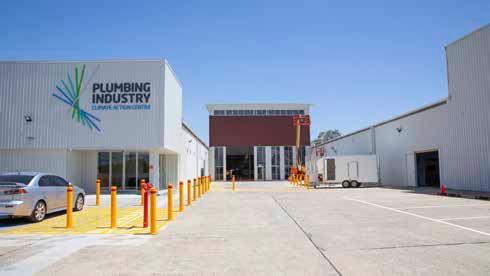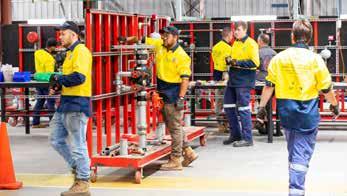
14 minute read
Legal
As the new year truly gets underway, the Fair Work Ombudsman (FWO) has declared that 2020 will be a year during which it focusses and cracks down on businesses that misclassify its employees as contractors.
As a clear indication of this focus, the FWO has launched an underpayment case against Queensland transport company, Boske Road Transport. The FWO alleges that Boske wrongly treated a number of delivery drivers as independent contractors when they were in fact employees. The FWO goes on to allege the drivers were covered by the Road Transport and Distribution Award, and because of this misclassification, Boske underpaid the drivers Award entitlements by some $63,800 between 2016 and 2018.
The drivers: • drove Boske-owned vehicles; • wore Boske uniforms; • had to work on days and at times set by the company; and • were paid according to the hours worked. In the claim the FWO asked the Court: • to order Boske to backpay the drivers; • to impose civil penalties (fines) against
Boske; • to declare that Boske breached the Fair
Work Act by failing to pay overtime, penalty rates, leave entitlements, superannuation and work-related costs; and • for an order that the business display a notice on site about workers’ rights and a notice that identifies the difference between contractors and employees.
The Fair Work Ombudsman issued a statement that “if employers misclassify employees as independent contractors and pay flat rates that undercut entitlements, they face serious consequences such as court action, hefty back-payment bills and penalties.”
For its part, Boske denies the claims.
Given the FWO’s stated intention to campaign on misclassified contractors for 2020, it is important for businesses to take the time to review and consider any independent contractors they engage, particularly if: 1. the business pays an hourly rate for work; 2. the business sets work hours; 3. pay is calculated according to the time spent working, rather than on achieving a particular task; 4. the contractors are portrayed as being a part of the business and working for the business (for example, by wearing uniforms or having business cards that identify the most part of the business); and 5. the contractor cannot be said to be genuinely operating their own business, but instead are working for the business (especially if they are indistinguishable from others who are employees).
While some businesses (and their workers) believe there are advantages to engaging people as independent contractors, the consequences of any court action and orders to back-pay wages and annual leave entitlements or to have civil penalties imposed may quickly make those advantages evaporate. As well, certain contractors must be covered by a business’s WorkCover policy in any event.
It is essential for the business’s legal risk management to take time to review and assess whether your independent contractors are in fact employees, and if they are, to recognise that fact and pay sufficiently to meet Award entitlements.
What to Do
If you have workers whom you treat as contractors, and their engagement is consistent with any of the points 1 to 5 above, then you need to take some steps to assess your exposure to a risk of the FWO investigating you and making adverse findings about your engagement practices. You also need to consider the likelihood that a supposed contractor may claim against you, or even worse, complain to the FWO, that you have misclassified them. There may be significant adverse financial consequences from such a claim. If one contractor succeeds (or even claims they have been misclassified), you could face claims by a number of others. Multiple claims are common – don’t become another sufferer.
If, for any of your contractor workers, you cannot say for sure that they are operating their own business, then you need to take steps to assess your exposure of an FWO investigation.
If you are unsure, contact Cornwalls for advice and to review your contractors’ terms of engagement and operation to ensure your arrangements with the contractors are lawful and do not expose you to the unnecessary risk of claims for underpayment of wages or civil penalties. You also need to remember that directors or other persons in control of the business (for example HR managers) who knowingly participate in a breach of these contractor arrangements can be subject to personal liability.
There may be ways to structure the contract arrangement that meet your business requirements but minimise the risk of misclassifying employees as contractors. Don’t leave this to chance or good luck. Review your contractor arrangements as soon as you can.
Queries
For further information please contact the MPAQ Workplace Relations team on 07 3273 0800.
Aritcle written by Robert King, Partner – Employment, Workplace Relations & Safety, and Martin Alden, Partner – Employment, Workplace Relations & Safety, Cornwalls Law + More
Disclaimer
This article is general commentary on a topical issue and does not constitute legal advice. If you are concerned about any topics covered in this article, we recommend that you seek legal advice.
In the days of COVID-19, our Federal and State Governments have urged employers to allow as many workers as possible to work from home. In terms of spatial isolation in order to control the possible transmission of COVID-19, that remains a sensible and necessary public health directive.
However, that does not mean that employers can ignore their health and safety obligations to their workers for work from home. Home becomes a workplace (or at least the space at home that is used for doing work is a workplace), and employers must take some degree of risk management steps to minimise the risk to health and safety while working at home. COVID-19 will not be an absolute defence to either a WorkCover claim or a work health and safety prosecution, if an employer does nothing more than direct people to work from home.
The Cornwalls Employment, Workplace Relations and Safety team have put together an off-site working checklist that employers can provide to their employees. The checklist directs the employee’s attention to important and potential hazards and risks that must be considered and managed when a worker is working from home.
The checklist covers the employee’s work area and environment (environmental conditions, emergency exit and safety equipment, electrical), workstation setup (chair, desk, monitors, keyboard and mouse), and communication. Points considered include: • If lighting is sufficient for the task being performed, easy to see, and comfortable on the eyes; • If a suitable first aid kit is available; • If seat pan on the chair has a round front and the height can be adjusted for preferred sitting height to desk; and • If there is adequate leg space under the workstation and feet can be flat on the ground, or a suitable footrest provided.
Employers should direct their employees to use the checklist as a risk management tool to assess their work area at home. The checklist can be found on the MPAQ Coronavirus Knowledge and Support page at www.mpaq.com.au/workplace-relations/coronavirus.
In this unique time, it may not be possible for an employer to inspect every worker’s home (and indeed, given that some may be in self-isolation, it may be impossible to inspect every worker’s home). An employer can, at the very least, have employees review and manage the risks themselves, and provide photographic proof of their home workspace.
The checklist can be sent to each employee asking them to complete it (either online, or to print off and complete).
Although the checklist does not provide a fool proof and complete defence to any potential claim, in the current circumstances, it demonstrates a best practice risk management approach to ensuring a business complies with its obligations for worker safety, and it opens the opportunity for communication and consultation with workers if in fact they identify potential hazards. The checklist may need to be tailored to your work requirements and/or the individual’s home environment – it is designed as a template.
If you wish to discuss any other aspects of work health and safety and working from home, please contact the Cornwalls Employment, Workplace Relations and Safety team on 07 3223 5900, or email r.king@cornwallsqld.com.au.
Article written by Robert King, Partner – Employment, Workplace Relations & Safety, Cornwalls Law + More
Disclaimer
This information and contents of this publication, current as at the date of publication, is general in nature to offer assistance to Cornwalls’ clients, prospective clients and stakeholders and is for reference purposes only. It does not constitute legal or financial advice. If you are concerned about any topic covered, we recommend that you seek your own specific legal and financial advice before taking any action.

The Essential First Step.

Before breaking ground remember the 5Ps of safe excavation.








MANAGING HEALTH AND SAFETY WHILE IMPLEMENTING SOCIAL DISTANCING MEASURES
With many businesses having to adjust the way they do their work in recent times, it’s important that your business continues to maintain health and safety practices, whether that’s in the office, at home, or on a jobsite. This article will go through some health and safety matters and ways to maintain social interaction while remaining socially distant.
Attending Workplace or Worksites
If an employee is required to attend the workplace (e.g. office) it is important to implement the social distancing requirements as determined by the Australian Government. If this cannot be achieved with the current work space layout, the employer and employees will need to develop ways in which this can be adhered to, such as moving some furniture around, having alternate working days in the office, etc. Other areas that employers may need to consider are: • Employee safety – if they are working alone in the office, are they able to lock the premises and also get out of the premises quickly. • Cleanliness – who is required to clean after each occasion when someone has been in the office? Is it a dedicated cleaner or are employees required to clean the areas? This would need to be communicated effectively with employees so all know their responsibilities. • The employer is regularly consulting with employees about identifying and managing any safety hazards and risks.
If an employee is required to attend a worksite, there are particular measures that need to be carried out as it will depend on the type of worksite. We have further information on our website, but factors may include emergency work at someone’s house. In this case members of the household should remain in a separate section of the house for the duration of the work being performed. Working from Home
Some business have moved to employees working from home. It is important for employers to be checking in regularly with employees and ensuring that they have adequate access to appropriate support, not only within the business but also in terms of their own psychological safety.
An employer would also want to have a Flexible Working Arrangements Policy to outline the expectations of working from home as well as a risk assessment checklist of the employees’ work space at their home.
In this climate, it is recommended that employers seek to: • Regularly and transparently communicate and share information with employees – this can be via email, videoconferencing, group texts, etc; • Provide employees with a point of contact to discuss concerns – this may be the business owner, an Employee Assistance Program (EAP), or a specialised service provider within an industry, such as Mates in Construction in the building and construction industry; and • Set boundaries for employees, such as start and finish times, breaks throughout the day, and regular stretches.
Employees on Stand Down or Minimal Work
It is important that an employer continues to communicate with all staff during COVID-19. This is especially important if employees have been stood down or are carrying out reduced hours of work. It is not only a legal requirement but it also maintains psychological safety for your employees.
Maintaining Human Interaction
There are multiple options for maintaining regular communication with employees, regardless of whether they are continuing to work in the office, on site, at home, are on stand down, or in isolation. Some ideas that we have come across include: • Twice a week teleconference to provide an update on the business situation and also to touch base with everyone and have a chat. As an employer, you may not know whether this is the only interaction an employee receives; therefore, it might be very much appreciated from the employee’s perspective. • Friday afternoon chats where employees get together via videoconferencing to catch up, advise of new projects, or the latest playlists/podcasts they have listened to. This may also help to maintain the culture of your business during this time and allow employees to maintain that connection with one another. • Organise for each employee to host a cooking session • A weekly challenge that people have to complete, such as kicking a ball into a bucket that is 10m away.
It is such unprecedented times that we are going through and the human element is what is going to keep each of us strong through this process. By maintaining the social aspect where possible, this may help your business to continue to grow when work returns.
For further information relating to this article or any workplace relations queries, please contact the MPAQ Workplace Relations team on 07 3273 0800.
Article written by Emma Ross - MPAQ, Human Resources Advisor
MATES ARE STRONGER TOGETHER: A REMINDER FROM MATES IN CONSTRUCTION
Hi, I’m Justin. I’m a plumber by trade and now a Field Officer for Mates in Construction.
The questions I get asked most often these days are: • How do I keep myself well in these challenging times? • What do I do if I am worried about a mate who I believe is struggling? • And what do I do if I am struggling?
I am not an expert, but as someone with a mental illness and a lived experience of suicide, these are some of the things I have learnt that keep me well and help me help other people that may be doing it tough.
Self-care is important to me. Why? Because when I am well, I not only have the fuel to get me through the tough stuff but it gives me the capacity to help my mates. Keeping my buckets topped up is key for me. The buckets represent different aspects of my life including physical (daily energy), emotional (relationships), mental (focus) and spiritual (purpose). I try to top each of those buckets up daily with self-care activities. They include things like gardening or going for a walk, calling a mate, hanging out with the kids, reading a book, doing a crossword, chilling out to music, or helping my neighbour. Those are just a few things that I do, but we are all different so think about what you would do to fill your buckets. Remember topping up our buckets is not an event but a daily routine that hopefully becomes a habit. It will make a big difference to how you feel about yourself and your ability to be there for other key people in your life.
Helping a mate who’s doing it tough? I break it down into four simple steps.
1
Notice changes in the things they do and say, especially if they are going through things that cause us all stress, such as job loss, relationship breakdown, or other tough situations.
2
Then ask: “what’s going on mate?” Call them out on the things you notice, such as: “mate you’re doing stuff and saying stuff that isn’t like you, what’s going on?”
3
Then listen – you don’t have to be a counsellor or psychologist, you just have to care. Listen to understand not to fix, because often we just want to be heard and understood!
4
Finally, connect them to help if needed. If they are a tradie they can call us at MATES on 1300 642 111. We are available 24/7 – make the call together. I know I was grateful when my mate made the call with me when I was doing it tough. If you are struggling, I encourage you to give us a call too, because Mates are stronger together during these tough times!
Learn more about the work that Mates in Construction does by visiting www.matesinconstruction.org.au.
Written by Justin Geange, Mates in Construction
World-class apprentice and post-trade training in sanitary plumbing, mechanical services, fire protection and OHS/WHS is now available at PICAC’s newest campus, PICAC Beenleigh.

PICAC Beenleigh’s state-of-the-art facilities include:
• In ground drainage and trench shoring training sand pit
• Three level training tower (simulating high rise building levels)

• Purpose-built confined space training area
• Advanced welding facilities and more.


Contact us to find out more about the courses we have available in-person and online! Ph: 1300 222 727 Email: infoqld@picac.edu.au









